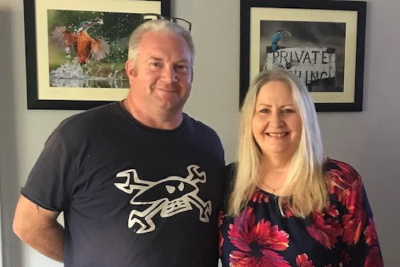Kath and Alan's story
After 16 years, Kath and her husband, Alan, haven't lost any of the motivation or drive for their roles as foster carers, which at first seem a world away from their previous careers in law and the RAF. Speaking to Kath about her passion for fostering, it's clear how she's inspired others around her to try fostering for themselves.


Over the years, Kath and Alan have shared their home and lives with young people of all ages, including children with multiple disabilities and high needs.
Right now, their house is called home by a nine-year-old boy who has been with them for five years and two teenage girls, aged 13. As an experienced foster carer, Kath was able to share lots of tips and advice for new and prospective foster carers with Foster with North East.
Becoming a foster carer is a practical way to make an impact
We started by talking to Kath about the unique path that brought her into fostering, shining a light on the different backgrounds and diverse skills foster carers bring to the profession.

"I said, I want to help them. I don't want to sit and type all day,"
So that's exactly what she did. The firm she was working for funded her law degree and supported her to move into a career as a Chartered Fellow Member of the Institute of Legal Executives.
After many happy years with the firm, becoming a lawyer and moving further north, Kath realised she wanted to more directly help the families and children affected by the problems she was seeing. She wanted to give children a safe home, support and hope and told Alan she thought they should try fostering. At the time, her husband was leaving the Air Force after 22 years and was supportive of the idea, and the pieces of the puzzle slotted together.
Get the Foster with North East information pack
The challenges and rewards of specialist fostering
Kath and Alan are strong advocates for fostering training and have taken the many opportunities that have come their way to complete courses and qualifications over the years. They are approved for specialist fostering, looking after children and young people with learning difficulties, disabilities and other high-care needs.
Kath is proud to advocate for children in her care, supporting them to get the help they need for their education and making sure they get to medical appointments, though she explains this has at times meant making changes to their lifestyle.
It is about the child, and you must understand that when you go into fostering. But I'm fortunate to have my husband as a full-time carer too. There are some lovely, lovely memories I wouldn't have had if I hadn't fostered.
While reminiscing about two special family trips to Disneyland Paris with two girls the family fostered long-term, Kath also speaks about how rewarding it is to see children progress. She shares the leaps and bounds the small boy who came to them aged just four has made in their care. He arrived struggling with boundaries, routines and behind in his development. He is autistic, and has ADHD as well as a plethera of additonal diagnosis.
"Now, he's in the best place he's ever been. He's absolutely adorable and funny. We can see his personality coming out, and we're proud that he believes it's his home."
Tips for fostering teens

Kath and Alan agreed that teens can have their own mindset and said they'd often found you can have a bit more personal freedom when looking after teens who can be more independent.
Sharing her tips for making teens feel welcome and handling any issues as they come up, Kath talked about the importance of clear communication, listening and finding compromise.
"You have to be clear about expectations, and if you're not straight away, that's when things can go pear-shaped. For example, we set a clear curfew time and lights out time and ask that electronics be left downstairs on the mantelpiece before bed. That's being risk averse, but it's also being sensible."

"She asked if she could stay over at her friend's house, and I said we'd look into it and try and make that happen - we could see it was important to her. We looked at what was possible and spoke to her friend's mum. She was able to go and had a fabulous time - although I'm not sure how much sleep they got, I think they did a lot of chatting!"
I find with teenagers, it's all about the delivery when you talk about things like house rules. It's about being clear and explaining things so they understand. Of course, any teenager can push back about rules and curfews. What is often surprising to people is that no matter the age of a child, they are often craving guidance and boundaries that have been missing at home. That goes hand-in-hand with the stability they need.
Advice for fostering and the fostering process
When we asked Kath what advice she would give to potential foster carers who, like her, want to directly impact children's lives, the experienced foster carer said applicants should be open about the process.
"Yes, the process can be long, and yes, the process is thorough. I've never applied for another job where I've had so many people interviewing me about my background. But reasons why you think you can't foster probably won't be a barrier - we need all kinds of people for fostering. Don't think something from your past will stop you from fostering. Just tell the truth, as it's important to build that trust with your allocated social worker; you've got nothing to lose."
Finally, Kath talked about the support available within the North East fostering community.
"Fostering can be very rewarding, and it can be challenging too. If you're worried about issues, many people, especially other foster carers, will happily talk to you. We need to speak to each other and support each other. Go to the fostering groups, take those topics you need help with, and you'll find others happy to give you advice and support you because we're all in the same boat at the end of the day."
Find out more
If you'd like to find out more about becoming a foster carer with Foster with North East why not complete our enquiry form? There's no expectations or pressure but the Foster with North East team are on-hand to offer support and answer any questions you may have. You can also learn more about fostering by reading the Foster with North East information pack..




